

PROUT's Concept of Economic Democracy. Dada Maheshvarananda. After Capitalism: Economic Democracy in Action. After Capitalism: Economic Democracy in Action is a 2012 book by United States author Dada Maheshvarananda, an activist, yoga monk and writer.
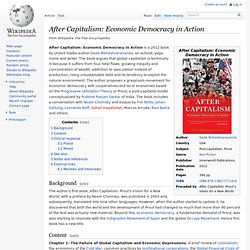
The book argues that global capitalism is terminally ill because it suffers from four fatal flaws: growing inequity and concentration of wealth, addiction to speculation instead of production, rising unsustainable debt and its tendency to exploit the natural environment. The author proposes a grassroots movement for economic democracy with cooperatives and local economies based on the Progressive Utilization Theory or Prout, a post-capitalist model conceptualized by Prabhat Ranjan Sarkar of India. Fore Word Reviews After Capitalism. Frei Betto. Carlos Alberto Libânio Christo, O.P., better known as Frei Betto[1] (born August 25, 1944) is a Brazilian writer, political activist, liberation theologist and Dominican friar.
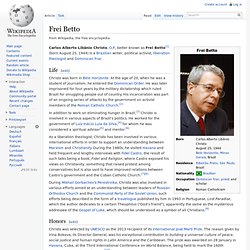
Life[edit] Christo was born in Belo Horizonte. At the age of 20, when he was a student of journalism, he entered the Dominican Order. He was later imprisoned for four years by the military dictatorship which ruled Brazil for smuggling people out of country. His incarceration was part of an ongoing series of attacks by the government on activist members of the Roman Catholic Church.[2] In addition to work on eliminating hunger in Brazil,[3] Christo is involved in various aspects of Brazil's politics. As a liberation theologist, Christo has been involved in various international efforts in order to support an understanding between Marxism and Christianity. Honors[edit] Christo was selected by UNESCO as the 2013 recipient of its International José Martí Prize. References[edit] Jump up ^ Harold Olmos (2005-02-03). Prabhat Ranjan Sarkar. Prabhat Ranjan Sarkar (21 May 1921 – 21 October 1990), also known by his spiritual name, Shrii Shrii Anandamurti and known as Baba to his disciples, was an Indian philosopher, author, social revolutionary, poet, composer, and linguist.
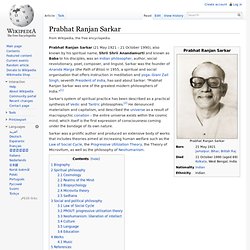
Sarkar was the founder of Ananda Marga (the Path of Bliss) in 1955, a spiritual and social organisation that offers instruction in meditation and yoga. Giani Zail Singh, seventh President of India, has said about Sarkar: "Prabhat Ranjan Sarkar was one of the greatest modern philosophers of India. Leonardo Boff. Professor Leonardo Boff Leonardo Boff is a Brazilian theologian and writer, known for his active support for the rights of the poor and excluded.
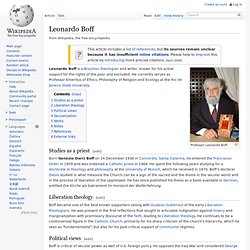
He currently serves as Professor Emeritus of Ethics, Philosophy of Religion and Ecology at the Rio de Janeiro State University. Studies as a priest[edit] Liberation theology[edit] Boff became one of the best known supporters (along with Gustavo Gutiérrez) of the early Liberation theologians. Johan Galtung. Biography[edit] Galtung's father and paternal grandfather were both physicians.
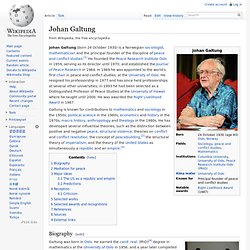
The Galtung name has its origins in Hordaland, where his paternal grandfather was born. Noam Chomsky. Avram Noam Chomsky (/ˈnoʊm ˈtʃɒmski/; born December 7, 1928) is an American linguist, philosopher,[21][22] cognitive scientist, logician,[23][24][25] political commentator and anarcho-syndicalist activist.
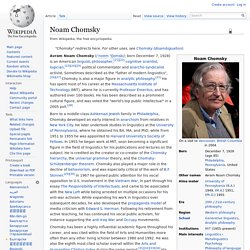
Sometimes described as the "father of modern linguistics",[26][27] Chomsky is also a major figure in analytic philosophy.[21] He has spent most of his career at the Massachusetts Institute of Technology (MIT), where he is currently Professor Emeritus, and has authored over 100 books. He has been described as a prominent cultural figure, and was voted the "world's top public intellectual" in a 2005 poll.[28] Born to a middle-class Ashkenazi Jewish family in Philadelphia, Chomsky developed an early interest in anarchism from relatives in New York City. Progressive Utilization Theory. Progressive Utilization Theory logo.
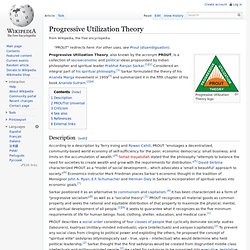
Neohumanism. Neohumanism is a holistic philosophical theory elaborated by Prabhat Ranjan Sarkar in his 1982 book, The Liberation of Intellect: Neohumanism (ISBN 81-7252-168-5).[1] With neohumanism, Sarkar redefines both humanity and humanism, as well as various commonly associated concepts.
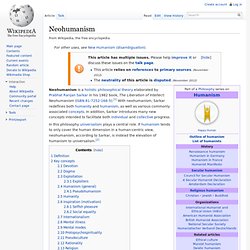
In addition, Sarkar introduces many new concepts intended to facilitate both individual and collective progress. In this philosophy universalism plays a central role. Post-capitalism. Socialist economics and the socialist calculation debate concern the organization and functioning of a post-capitalist system.
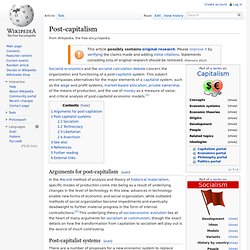
This subject encompasses alternatives for the major elements of a capitalist system, such as the wage and profit systems, market-based allocation, private ownership of the means of production, and the use of money as a measure of value; and critical analysis of post-capitalist economic models.[1] Arguments for post-capitalism[edit] Critiques of Capitalism. Economic democracy. Economic Democracy, P.R.
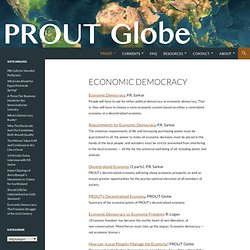
SarkarPeople will have to opt for either political democracy or economic democracy. That is, they will have to choose a socio-economic system based on either a centralized economy or a decentralized economy. Requirements for Economic Democracy, P.R. SarkarThe minimum requirements of life and increasing purchasing power must be guaranteed to all, the power to make all economic decisions must be placed in the hands of the local people, and outsiders must be strictly prevented from interfering in the local economy — all this for the universal well being of all, including plants and animals.
Decentralized Economy (2 parts), P.R. PROUT’s Decentralized Economy, PROUT GlobeSummary of the essential points of PROUT’s decentralized economy. Economic Democracy vs. How can «Local People» Manage the Economy? Why We Need Economic Democracy, Dada Vedaprajinananda«In the immediate aftermath of most revolutions life goes on as it did before. Economic Movements.